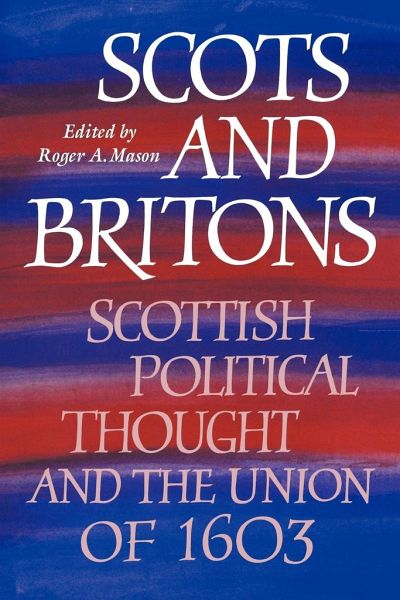
Scots and Britons
Scottish Political Thought and the Union of 1603
Herausgeber: Mason, Roger A.

PAYBACK Punkte
22 °P sammeln!
Twelve essays which examine Scottish participation in the creation of the British monarchy.This collection of essays by distinguished scholars from Britain and North America constitutes a major contribution to the process of remapping the history of early modern British political thought. Based on a seminar held at the Folger Institute's Centre for the History of British Political Thought, it takes the union of the Anglo-Scottish crowns in 1603 as its principal focus and examines the background to, and consequences of, the creation of a British monarchy from a distinctively Scottish viewpoint....
Twelve essays which examine Scottish participation in the creation of the British monarchy.
This collection of essays by distinguished scholars from Britain and North America constitutes a major contribution to the process of remapping the history of early modern British political thought. Based on a seminar held at the Folger Institute's Centre for the History of British Political Thought, it takes the union of the Anglo-Scottish crowns in 1603 as its principal focus and examines the background to, and consequences of, the creation of a British monarchy from a distinctively Scottish viewpoint. In the process, it provides a pioneering study of Scottish political thought from the Reformation of 1560 to the Covenanting Revolution of the 1640s and sheds new light on the collapse of multiple kingship in the mid-seventeenth century and the Scots' participation in the invention of Britain.
Review quote:
'- a lucid, learned book -'. Books in Scotland
Table of contents:
Introduction: Imagining Scotland: Scottish political thought and the problem of Britain 1560-1650 Roger A. Mason; Part I. Perspectives on Union: 1. The union of 1603 Jenny Wormald; 2. Scotland, the union and the idea of a 'General crisis' Maurice Lee, Jr.; 3. The vanishing emperor: British kingship and its decline Keith M. Brown; Part II. George Buchanan: 4. George Buchanan, James VI and neo-Classicism Rebecca W. Bushnell; 5. George Buchanan, James VI and the Presbyterians Roger A. Mason; 6. George Buchanan and the anti-monarchomachs J. H. Burns; Part III. Empire and Identity: 7. The Scottish Reformation and the Origins of Anglo-British imperialism Roger A. Mason; 8. Number and National consciousness: the Edinburgh mathematicians and Scottish political culture at the union of the crowns Arthur H. Williamson; 9. Law, sovereignty and the union Brian P. Levack; Part IV. The Convenanters: 10. The political ideas of a covenanting leader: Archibald Campbell, Marquis of Argyll Edward J. Cowan; 11. Lex rex iusto posita: Samuel Rutherford on the origins of government John D. Ford; Postscript: two kingdoms and three histories? Political thought in British contexts J. G. A. Pocock; Index.
This collection of essays by distinguished scholars from Britain and North America constitutes a major contribution to the process of remapping the history of early modern British political thought. Based on a seminar held at the Folger Institute's Centre for the History of British Political Thought, it takes the union of the Anglo-Scottish crowns in 1603 as its principal focus and examines the background to, and consequences of, the creation of a British monarchy from a distinctively Scottish viewpoint. In the process, it provides a pioneering study of Scottish political thought from the Reformation of 1560 to the Covenanting Revolution of the 1640s and sheds new light on the collapse of multiple kingship in the mid-seventeenth century and the Scots' participation in the invention of Britain.
Review quote:
'- a lucid, learned book -'. Books in Scotland
Table of contents:
Introduction: Imagining Scotland: Scottish political thought and the problem of Britain 1560-1650 Roger A. Mason; Part I. Perspectives on Union: 1. The union of 1603 Jenny Wormald; 2. Scotland, the union and the idea of a 'General crisis' Maurice Lee, Jr.; 3. The vanishing emperor: British kingship and its decline Keith M. Brown; Part II. George Buchanan: 4. George Buchanan, James VI and neo-Classicism Rebecca W. Bushnell; 5. George Buchanan, James VI and the Presbyterians Roger A. Mason; 6. George Buchanan and the anti-monarchomachs J. H. Burns; Part III. Empire and Identity: 7. The Scottish Reformation and the Origins of Anglo-British imperialism Roger A. Mason; 8. Number and National consciousness: the Edinburgh mathematicians and Scottish political culture at the union of the crowns Arthur H. Williamson; 9. Law, sovereignty and the union Brian P. Levack; Part IV. The Convenanters: 10. The political ideas of a covenanting leader: Archibald Campbell, Marquis of Argyll Edward J. Cowan; 11. Lex rex iusto posita: Samuel Rutherford on the origins of government John D. Ford; Postscript: two kingdoms and three histories? Political thought in British contexts J. G. A. Pocock; Index.




